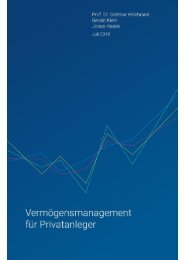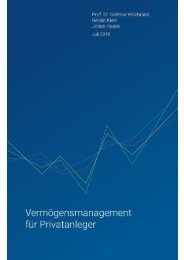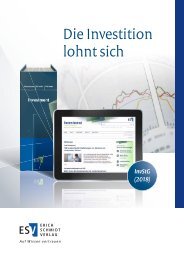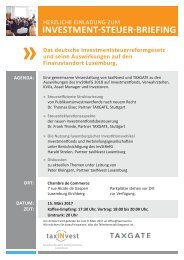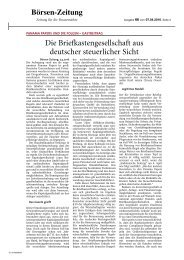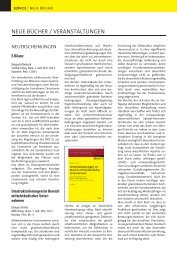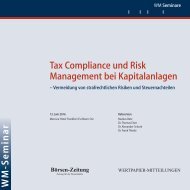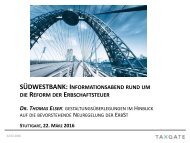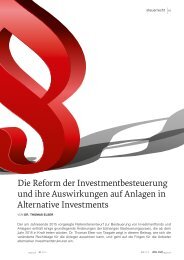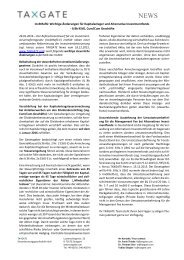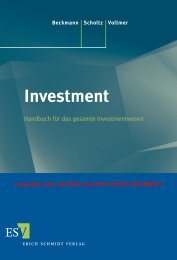Create successful ePaper yourself
Turn your PDF publications into a flip-book with our unique Google optimized e-Paper software.
EUROPE Q&A
D C E ( G E R M A N Y, F R A N C E , C E N T R A L E U R O P E , A U S T R I A A N D L U X E M B O U R G ) A N D S PA I N
Do you anticipate any significant legislative changes in the
future with a material impact on tax in your region?
We can clearly anticipate that there will be changes in the tax regulations.
All governments will be facing a double challenge: on one hand,
finding resources to finance huge expenses derived from COVID-19.
Increase of taxes can easily reach this objective, as well as a trend to
protectionism (Customs Duties). The fight to attract taxation between
the countries with large company headquarters and the countries
where the customer base resides will lead to a frenzy of antagonist
laws which will trigger double taxation.
On the other hand, such an increase needs to be balanced to allow
businesses to get back to the activity, to invest and not to suffer from
the tax burden. In this respect, we can expect for example change in
the rule of offsetting tax losses. Government will more than ever scrutinize
the adequacy of transfer pricing rules.
How would you describe the tax controversy landscape in your
region/jurisdiction?
The tax controversy landscape in our region has clearly increased during
the last decade. There are more and more claims and litigations
regarding taxes due to the speed over which tax provisions are
adopted, in order to respond to the public opinion or budget needs,
and constraints of EU legislation. Numerous tax provisions are being
challenged by the EU court, here again, often due to new tax provisions
enacted by local Member States Governments & Parliaments
without taking time to analyse all the consequences.
In addition to the increase of cases, we have also noted an increased
level of aggressiveness in the way discussions are conducted.
Less inclined to discuss a balanced solution, the Tax Authorities keep
their position due to the government pressure, which leads to an increased
level of tax controversy in front of the Courts.
Do you expect tax procedures in your region to move towards
common standards or diverge in the future?
We expect some degree of convergence due to the EU reforms and
common goal to confirm that companies apply sustainable tax policies.
The various CBCR and Mandatory Disclosure Rules apply to all
EU companies in a similar way. However, same as SAF-T in its time,
the wish to common standards, leading to common procedures, is
often contradicted by the will of Member State governments to impose
their own local specificities.
Is the global drive towards regulation going to affect tax
practice? If yes, in which areas?
Our tax practices now have common foundations in technical skills
and can to some extent advise companies around the entire region.
However, as noted above, as long as States consider tax as a differentiator
to improve either competitiveness or warrant protectionism,
local domestic knowledge will be needed, and I don’t see this
changing in the foreseeable future.
What do you see as direct impact of COVID-19 in your
practice?
There are several direct impacts to our practices in our Region:
Some areas of practice, such as M&A, have experienced a sudden
decrease, however we anticipate that some strategic buyers and Private
Equity Houses will be keen to look at targets available at low market
prices. However, the need to have visibility on performance will probably
mean a slow recovery generally, mid-2021. Similarly, large companies
have deferred any large reorganization, which was considered
as “non-essential”. Our clients indicate that these transformation and
reorganization plans will pick up this summer or in the fall.
The other practice areas are much more resilient.
Some practices will thrive, as the world gets a wakeup call to
“too much” globalization, many groups are exploring a more regional
approach to industrial relocations. The crisis is sanitary but
also accelerates the focus on the imperious need to be more sustainable
for the planet. As a result, “short circuits” will be analysed
compared to manufacturing products on the other side of the
planet. These strategic changes are complex, and complexity requires
to carefully analyse the tax and legal consequences, therefore
our practices anticipate many areas to assist our clients.
The crisis has also accelerated digital economy. Pre-Covid, the
digital taxes were already a significant focus point at the level of European
governments, to align an old fashion tax system to the new
economy and get tax payments in a more efficient way in their view.
As mentioned, we can expect that governments will increase
their tax audits to finance their deficits. Courts are just starting to
reopen, tax litigation will pick up after a 2 months full stop.
One can also expect that the need for tax transparency and sustainability
will increase: we expect that governments will pressure
companies to explain/justify how they contribute to the resources
of the countries where they carry out their activities.
This document has been prepared solely for the purpose of publishing in the 2020 Guide to the World’s Leading Tax Advisers and may not be used for any other purpose. This document
and its contents may not be reproduced, redistributed or passed on, directly or indirectly, to any other person in whole or in part without Deloitte’s prior written consent.
Deloitte refers to one or more of Deloitte Touche Tohmatsu Limited (“DTTL”), its global network of member firms, and their related entities (collectively, the “Deloitte organization”).
DTTL (also referred to as “Deloitte Global”) and each of its member firms and related entities are legally separate and independent entities, which cannot obligate or bind each other in respect
of third parties. DTTL and each DTTL member firm and related entity is liable only for its own acts and omissions, and not those of each other. DTTL does not provide services to
clients. Please see www.deloitte.com/about to learn more.
Deloitte is a leading global provider of audit and assurance, consulting, financial advisory, risk advisory, tax and related services. Our global network of member firms and related entities in
more than 150 countries and territories (collectively, the “Deloitte organization”) serves four out of five Fortune Global 500® companies. Learn how Deloitte’s approximately 312,000 people
make an impact that matters at www.deloitte.com.
This communication contains general information only, and none of Deloitte Touche Tohmatsu Limited (“DTTL”), its global network of member firms or their related entities (collectively,
the “Deloitte organization”) is, by means of this communication, rendering professional advice or services. Before making any decision or taking any action that may affect your finances or
your business, you should consult a qualified professional adviser.
No representations, warranties or undertakings (express or implied) are given as to the accuracy or completeness of the information in this communication, and none of DTTL, its member
firms, related entities, employees or agents shall be liable or responsible for any loss or damage whatsoever arising directly or indirectly in connection with any person relying on this communication.
DTTL and each of its member firms, and their related entities, are legally separate and independent entities.
© 2020. For information, contact Deloitte Global.
32 EXPERTGUIDES TAX





